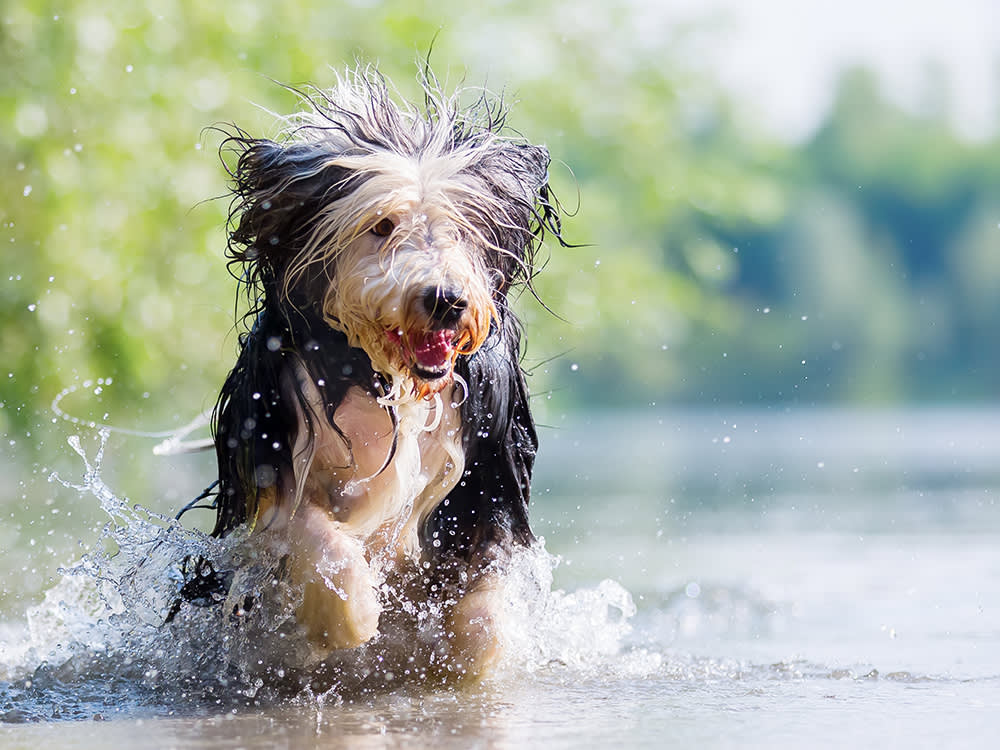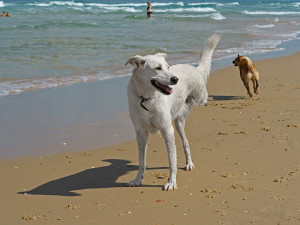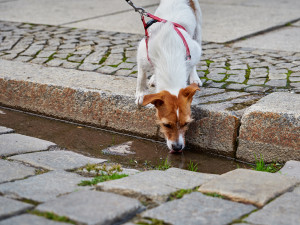When Drinking Too Much Water Is Deadly
How to keep your swimming dog safe

share article
Last week, a friend’s dog had a close call with water intoxication. Her dog crew was playing in a local river when one of her Border Collies emerged staggering and vomitingopens in a new tab liquid. Symptoms quickly worsened on the way to the vet, but after a few harrowing days, the pup was fortunate to make a full recovery. Apparently, her dog ingested too much water while repeatedly diving into the river, mouth open, trying to catch a ball. Drinking too much causes electrolyte levels to drop, thinning blood plasma and leading to swelling of the brain and other organs.
Before I learnt about water intoxication, I thought that playing in the lake (or any body of water) was safe if your dog was a strong swimmer. But now I know to be mindful of how my pups interact with the water and force them to take ample breaks. Dogs can even drink too much water from playing with a lawn sprinkler, believe it or not. Unfortunately, water intoxication progresses quickly, so it’s important to review the signs to ensure you can get your dog to the vet as soon as possible if necessary.
Causes of water intoxication in dogs
When too much water is consumed in a short period of time – especially if the dog isn’t urinating or throwing up any of the water – the balance of electrolytes in the dog’s body is disrupted, which can cause a disturbance in brain function. Water intoxication can lead to brain damage, heart failure, and even death. Fortunately, water poisoning isn’t common, but it’s important to be aware of the risk. The most frequent cases involve swimming dogs that ingest too much water and dogs who drink too many fluids after playing or exercising.
Symptoms of water intoxication
Symptoms of water intoxication in dogs include lack of coordination, lethargy, nauseaopens in a new tab, bloating, vomitingopens in a new tab, dilated pupils, glazed eyes, light gum colour and excessive salivation. Advanced symptoms include difficulty breathing, collapsing, loss of consciousness and seizures.
Treatment of water intoxication
Because water intoxication in dogs can progress so quickly, time is critical. If your dog exhibits these symptoms, get to a vet immediately. A low level of electrolytes will show up on a blood test and confirm the condition. Treatment for water intoxication includes fluids to put electrolytes back in the system and sometimes a diuretic. Both pups and their parents need to practice water safety.

JoAnna Lou
JoAnna Lou is a New York City-based researcher, writer and agility enthusiast.
Related articles
![Three-legged white dog at the beach]() opens in a new tab
opens in a new tabHow to Keep Your Three-Legged Dog Outpacing All the Other Pups at the Park
Six tips to help your tripod dog stay in tip-top shape
![Pug dog scooting on a wooden floor in the kitchenFunny dog enjoying scratching his bum on grass at public dog park.]() opens in a new tab
opens in a new tabVet Advice and Home Remedies For Dog Scooting
A vet on what to do when ‘anal sacs go bad’
![Grey cat eats a strawberry]() opens in a new tab
opens in a new tabCan Cats Eat Strawberries?
Soon, they’ll be demanding you make this strawberry ice cream recipe on repeat
![Dog drinking water from a puddle in the road]() opens in a new tab
opens in a new tabGiardia In Dogs: Signs, Symptoms and Treatment of This Summer Parasite
If your dog drinks from puddles or splashes around in streams, read this
![Woman taking temperature of her brown dog.]() opens in a new tab
opens in a new tabWhat Should Your Dog’s Temperature Be? A Step-by-Step Guide on Taking Your Dog’s Temperature at Home
Spoiler: there are more ways than the one you’d rather avoid




